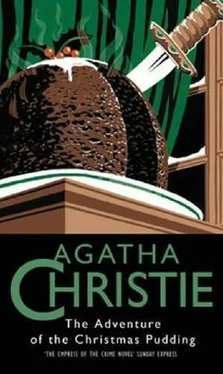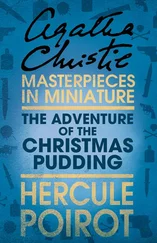Contents:
The Adventure of the Christmas Pudding
The Mystery of the Spanish Chest
The Under Dog
Four-and-Twenty Blackbirds
The Dream
Greenshaw's Folly
FOREWORD BY AGATHA CHRISTIE
This book of Christmas fare may be described as "The Chef's Selection." I am the Chef!
There are two main courses: The Adventure of the Christmas Pudding and The Mystery of the Spanish Chest; a selection of Entrées: Greenshaw's Folly, The Dream, and The Under Dog; and a Sorbet: Four-and-Twenty Blackbirds.
The Mystery of the Spanish Chest may be described as a Hercule Poirot Special. It is a case in which he considers he was at his best! Miss Marple, in her turn, has always been pleased with her perspicuity in Greenshaw's Folly.
The Adventure of the Christmas Pudding is an indulgence of my own, since it recalls to me, very pleasurably, the Christmases of my youth.
After my father's death, my mother and I always spent Christmas with my brother-in-law's family in the north of England - and what superb Christmases they were for a child to remember! Abney Hall had everything! The garden boasted a waterfall, a stream, and a tunnel under the drive! The Christmas fare was of gargantuan proportions. I was a skinny child, appearing delicate, but actually of robust health and perpetually hungry! The boys of the family and I used to vie with each other as to who could eat most on Christmas Day. Oyster Soup and Turbot went down without undue zest, but then came Roast Turkey, Boiled Turkey and an enormous Sirloin of Beef. The boys and I had two helpings of all three! We then had Plum Pudding, Mince-pies, Trifle and every kind of dessert. During the afternoon we ate chocolates solidly. We neither felt, nor were, sick! How lovely to be eleven years old and greedy!
What a day of delight from "Stockings" in bed in the morning, Church and all the Christmas hymns, Christmas dinner, Presents, and the final Lighting of the Christmas Tree!
And how deep my gratitude to the kind and hospitable hostess who must have worked so hard to make Christmas Day a wonderful memory to me still in my old age.
So let me dedicate this book to the memory of Abney Hall, its kindness and its hospitality.
And a happy Christmas to all who read this book.
Agatha Christie
THE ADVENTURE OF THE CHRISTMAS PUDDING
"I regret exceedingly..." said M. Hercule Poirot.
He was interrupted. Not rudely interrupted. The interruption was suave, dexterous, persuasive rather than contradictory.
"Please don't refuse offhand, M. Poirot. There are grave issues of State. Your cooperation will be appreciated in the highest quarters."
"You are too kind," Hercule Poirot waved a hand, "but I really cannot undertake to do as you ask. At this season of the year..."
Again Mr Jesmond interrupted. "Christmas time," he said, persuasively. "An old-fashioned Christmas in the English countryside."
Hercule Poirot shivered. The thought of the Christmas countryside at this season of the year did not attract him.
"A good old-fashioned Christmas!" Mr Jesmond stressed it.
"Me - I am not an Englishman," said Hercule Poirot. "In my country, Christmas, it is for the children. The New Year, that is what we celebrate."
"Ah," said Mr Jesmond, "but Christmas in England is a great institution and I assure you at Kings Lacey you would see it at its best. It's a wonderful old house, you know. Why, one wing of it dates from the fourteenth century."
Again Poirot shivered. The thought of a fourteenth-century English manor house filled him with apprehension. He had suffered too often in the historic country houses of England. He looked round appreciatively at his comfortable modern flat with its radiators and the latest patent devices for excluding any kind of draught.
"In the winter," he said firmly, "I do not leave London."
"I don't think you quite appreciate, Mr Poirot, what a very serious matter this is." Mr Jesmond glanced at his companion and then back at Poirot.
Poirot's second visitor had up to now said nothing but a polite and formal "How do you do." He sat now, gazing down at his well-polished shoes, with an air of the utmost dejection on his coffee-coloured face. He was a young man, not more than twenty-three, and he was clearly in a state of complete misery.
"Yes, yes," said Hercule Poirot. "Of course the matter is serious. I do appreciate that. His Highness has my heartfelt sympathy."
"The position is one of the utmost delicacy," said Mr Jesmond.
Poirot transferred his gaze from the young man to his older companion. If one wanted to sum up Mr Jesmond in a word, the word would have been discretion. Everything about Mr Jesmond was discreet. His well-cut but inconspicuous clothes, his pleasant, well-bred voice which rarely soared out of an agreeable monotone, his light-brown hair just thinning a little at the temples, his pale serious face. It seemed to Hercule Poirot that he had known not one Mr Jesmond but a dozen Mr Jesmonds in his time, all using sooner or later the same phrase - "a position of the utmost delicacy."
"The police," said Hercule Poirot, "can be very discreet, you know."
Mr Jesmond shook his head firmly.
"Not the police," he said. "To recover the - er - what we want to recover will almost inevitably involve taking proceedings in the law courts and we know so little. We suspect, but we do not know."
"You have my sympathy," said Hercule Poirot again.
If he imagined that his sympathy was going to mean anything to his two visitors, he was wrong. They did not want sympathy, they wanted practical help. Mr Jesmond began once more to talk about the delights of an English Christmas.
"It's dying out, you know," he said, "the real old-fashioned type of Christmas. People spend it at hotels nowadays. But an English Christmas with all the family gathered round, the children and their stockings, the Christmas tree, the turkey and plum pudding, the crackers. The snow-man outside the window..."
In the interests of exactitude, Hercule Poirot intervened.
"To make a snow-man one has to have the snow," he remarked severely. "And one cannot have snow to order, even for an English Christmas."
"I was talking to a friend of mine in the meteorological office only today," said Mr Jesmond, "and he tells me that it is highly probable there will be snow this Christmas."
It was the wrong thing to have said. Hercule Poirot shuddered more forcefully than ever.
"Snow in the country!" he said. "That would be still more abominable. A large, cold, stone manor house."
"Not at all," said Mr Jesmond. "Things have changed very much in the last ten years or so. Oil-fired central heating."
"They have oil-fired central heating at Kings Lacey?" asked Poirot. For the first time he seemed to waver.
Mr Jesmond seized his opportunity. "Yes, indeed," he said, "and a splendid hot water system. Radiators in every bedroom. I assure you, my dear M. Poirot, Kings Lacey is comfort itself in the winter time. You might even find the house too warm."
"That is most unlikely," said Hercule Poirot.
With practised dexterity Mr Jesmond shifted his ground a little.
"You can appreciate the terrible dilemma we are in," he said, in a confidential manner.
Hercule Poirot nodded. The problem was, indeed, not a happy one. A young potentate-to-be, the only son of the ruler of a rich and important native State had arrived in London a few weeks ago. His country had been passing through a period of restlessness and discontent. Though loyal to the father whose way of life had remained persistently Eastern, popular opinion was somewhat dubious of the younger generation. His follies had been Western ones and as such looked upon with disapproval.
Читать дальше












